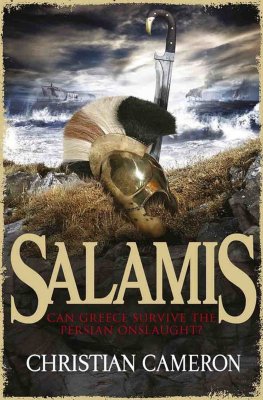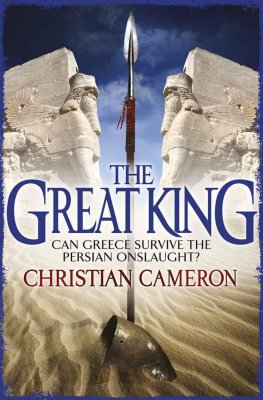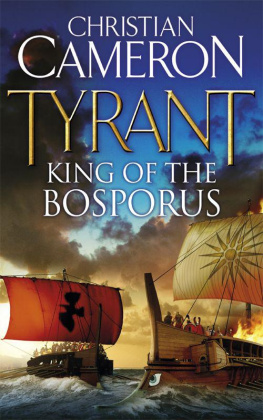Introduction
This book is about the wrath of God. It is also about the complete annihilation of all that exists. As we read through Scripture, we are constantly aware that Gods dealings with people are focused on their obedience. In book after book, God calls people and nations to account.
In this short book, we would face a real struggle if we were to tackle all that Scripture has to say on the subject. To simplify the process, I have had to limit my presentation to just one 3000-year-old prophecy. We shall see how the subjects of this prophecy come to life. Their relations with God and each other reverberate over the centuries. We are enabled to view past, present and future in one extraordinary sweep.
For both Christians and non-Christians, this emphasis on Gods wrath may cause some consternation and a reflex action. So often, we have been exposed to the idea of God being loving and kind that we forget this other equally important aspect of his character.
The experience that most of us have of wrath or anger is an uncontrolled, blustering rant, of which, with hindsight, causes us an acute sense of embarrassment. It follows that God could not possibly be capable of demonstrating such a futile and shameful demonstration.
Attributing impotent wrath to God must be refuted. If we took the time and studied the Scriptures, we would be surprised to discover that there are more references to Gods wrath and his determination to bring judgement upon the rebellious than there are references to his love and compassion.
Many a theological textbook has been devoted to the topic of Gods wrath. This book is not one of them. It is an attempt to bring the modern day experiences of the average woman into the light of the Scriptures. A way of bringing a sense of profound significance to what most of us wrestle with at some stage in our lives: love of a man. Maybe even a way forward with hope when we have been disappointed by a love which has failed. In so doing, the workings of God, and in particular his wrath, are brought to bear on our very own personal stories. We will find that our lives, rather than being insignificant, take on a monumental importance. We are involved in the very formation and destruction of stars and galaxies. The very earth under our feet trembles.
How do we reconcile these two topics? How does the wrath of God relate in any way to love and relationships? My answer to these questions will involve a survey of the development of love relationships over time. I will relate to you my own romantic entanglements and those of medieval times. After this, I will do a comparative study with the Scriptures to determine Gods plan for men and women. As previously suggested, I am most concerned with whether these Scriptural references will be of any relevance to the modern day woman. Are they merely a how to of day-to-day relational living, or is there some significance to these references in an eternal non-temporal sense?
A survey of this type is problematic. Modern Western women have been exposed to a certain type of education. A lot of professions, especially the sciences, ground their activities upon evidence based practice. This is a wise principle. The mind becomes disciplined. Reason becomes paramount.
The problem that faces us with a survey of this sort is that Scripture often eludes these bounds. Conclusions reached as we read are often the result of revelation. Revelation is a spiritual activity. As we read the Scriptures, especially those which seem bizarre or impossible, there is an invisible presence, the Holy Spirit. The third person of a triune God, his role is to encourage and affirm belief in Scripture. For example, he brings about a conviction that what we read of is true. How is it that we can believe what seems to be impossible? A virgin birth, a healing of the blind, the resurrection of the dead and more. All of these truths are spiritually discerned and assented to because of the presence of this invisible spirit working upon our hearts and minds.
Revelation does not exclude the need for an objective test. Over time, we have gained enormously from the works of archaeology and anthropology. The cultures that are written of in Scripture come to life when we see where they lived, their tools and means of transport. The New Testament is one such set of writings which rely upon eyewitness accounts. The very words of Jesus Christ recorded verbatim. Along with his words and actions are his way of affirming certain critical Old Testament prophecies to be, referring to himself. His death was witnessed by many as was the fact of his resurrected physical body. Thus our desire for objectivity is satisfied.
There are further problems. An understanding of the nature of prophecy and apocalyptic language are distractions which can consume and confuse the reader as she attempts to tackle Scripture. Dragons, serpents, beasts and angels appear and are vanquished by a lamb.
The nature of the lives which we read of is of a distant era. We read of chariots, altars, Asherah poles, holy mountains, deserts, tents. Kings rule, their rule absolute, validated by strange gods. Prophets and horsemen of the apocalypse. There is no democracy. God is seen to be active in every event.
Reading Scripture can be a battle. I will hopefully be able to take my readers on a journey slowly and carefully by calling on the Holy Spirit to guide each and every one of you into a new understanding of reality.













